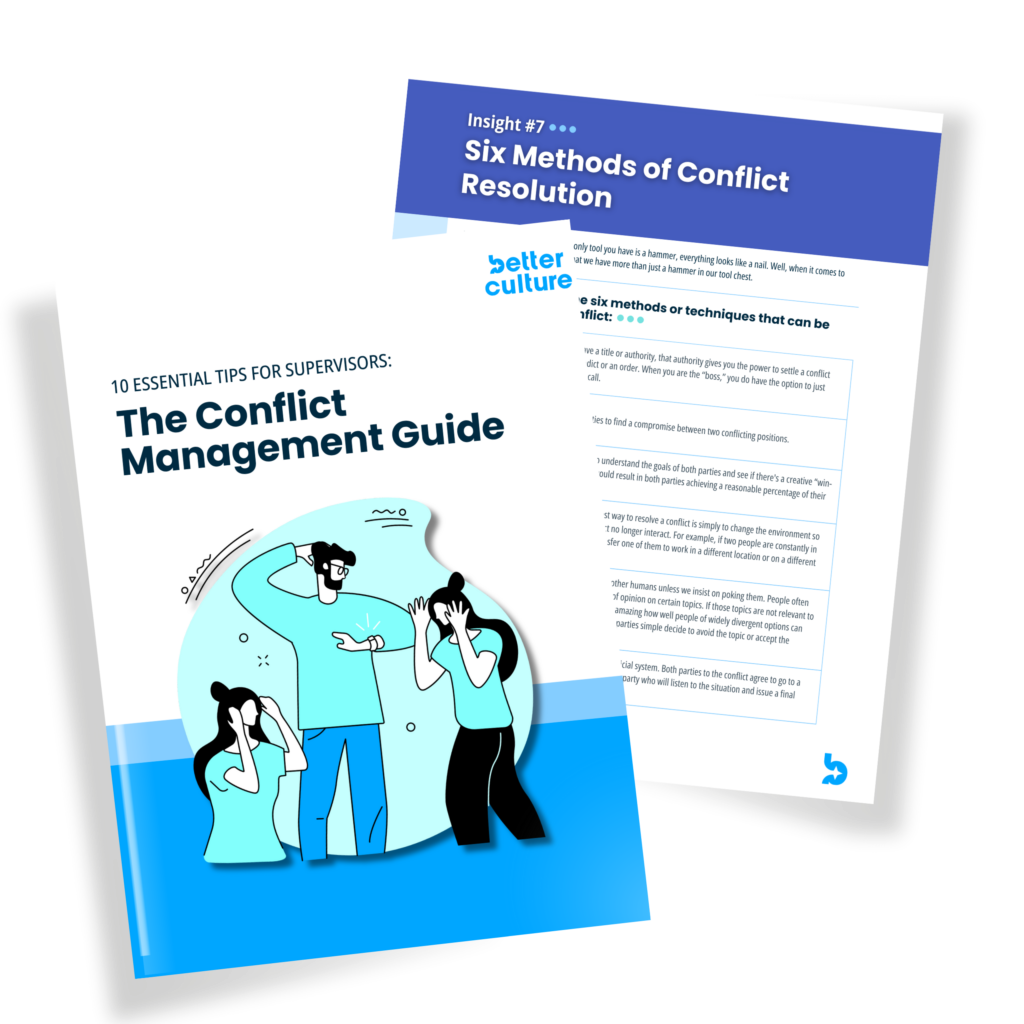In business, conflict is both inevitable and necessary for growth and innovation. Leaders who understand this can transform potential disruptions into opportunities for improvement and strengthened relationships.
Here, we delve into actionable strategies that can help leaders navigate and manage conflict effectively. For those seeking more comprehensive insights and tools, check out our detailed Conflict Management Guide.
Appreciate Conflict as a Catalyst for Change
As organizations strive for excellence, they implement new ideas and processes. These changes will often generate resistance and, consequently, conflict. Instead of viewing all conflict as negative, leaders should recognize that conflict can also serve as a catalyst for improvement. This perspective shift can help leaders approach conflict with a more nuanced and constructive mindset.
Key Insight: Conflict is often the price you pay for excellence. Embrace it as an opportunity to push boundaries and innovate.
Foster Open Communication
Effective conflict management begins with open communication. Leaders should create an environment where team members feel safe to express their opinions and concerns without fear of retribution. Encouraging intellectual disagreement while maintaining healthy personal relationships is crucial for high-performance team dynamics.
Actionable Tip: Regularly schedule open forums or meetings where team members can voice their thoughts and ideas. This preemptively addresses potential conflicts and fosters a culture of transparency and trust.
Practice Active Listening
Active listening is a cornerstone of conflict resolution. When leaders take the time to understand the perspectives of all parties involved, they can identify the root causes of conflict and address them more effectively. This approach demonstrates empathy and respect, which can de-escalate tensions.
Actionable Tip: During conflict discussions, practice active listening by maintaining eye contact, staying genuinely curious about the other party’s perspective, asking good questions, and paraphrasing what the other person has said to confirm comprehension.
Tailor Your Conflict Resolution Approach
Different conflicts require different resolution strategies. Leaders should be adept at identifying the nature of the conflict and choosing the appropriate method to address it. For instance, conflicts over methods might be resolved through authoritative decision-making, while conflicts over goals will usually benefit from negotiation or collaboration.
Key Strategies:
- Power: Use authority to make decisions when necessary, but sparingly.
- Negotiation: Find compromises that balance conflicting positions.
- Collaboration: Seek win-win solutions that meet the goals of all parties involved.
- Structural Modification: Change the environment to reduce interactions between conflicting parties.
- Acceptance or Avoidance: Sometimes, it’s best to avoid contentious topics that are not critical to the work at hand.
- Refer to Authority: Use neutral third parties, like managers or arbitrators, to resolve deep-seated conflicts.
Manage Emotions Effectively
Emotions can intensify conflicts, making resolution more challenging. Leaders must learn to manage their own emotions and help their team members do the same. This involves recognizing and addressing emotional triggers and maintaining a calm and composed demeanor.
Actionable Tip: Teach and practice techniques such as deep breathing, mindfulness, and reframing negative thoughts to help manage emotions during conflicts.
Promote a Culture of Feedback
Feedback, when delivered constructively, can prevent minor issues from escalating into major conflicts. Leaders should foster a culture where feedback is viewed as a tool for growth rather than criticism. Educate employees from as early as new employee orientation that being coached (and being coachable) is highly correlated with long-term success.
Actionable Tip: Implement regular feedback sessions where team members can both give and receive feedback in a structured and supportive environment.
Address the Unspeakables
Unspoken issues can fester and lead to significant conflict. Leaders must have the courage to address these “unspeakables” by initiating difficult conversations. This helps to clear the air and build a foundation of trust and mutual respect.
Actionable Tip: Start conversations about sensitive topics with a focus on maintaining the relationship. For example, “Our relationship is important to me, and I want to discuss an interaction we had recently to ensure we’re on the same page.”
Utilize Mediation When Necessary
For particularly complex or emotionally charged conflicts, mediation can be an effective tool. A neutral third party can help facilitate communication, reduce emotional intensity, and guide the parties toward a mutually acceptable resolution.
Actionable Tip: Train key team members in basic mediation skills to help resolve conflicts before they escalate.
In Conclusion…
Conflict management is a critical skill for leaders. By embracing conflict as a natural and necessary part of growth, fostering open communication, practicing active listening, and tailoring conflict resolution approaches, leaders can navigate conflicts effectively. For more in-depth strategies and tools, download our Conflict Management Guide and equip yourself with the knowledge to transform conflict into an opportunity for excellence.




